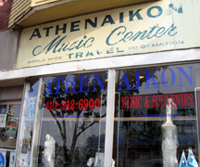Baltozine Round-Up: Post Typography, Banjo Pete, Diner, and more
The Baltozine Roundup is our regular blog feature wherein we take a look at what national periodicals are saying about Baltimore-area arts, events, people, and places.
 In Fretboard Journal (#25), Peter Szego's article "Building A New Old Banjo" talks to local banjo makers Kevin Enoch and Banjo Pete Ross.
In Fretboard Journal (#25), Peter Szego's article "Building A New Old Banjo" talks to local banjo makers Kevin Enoch and Banjo Pete Ross.
 The new issue of Print Magazine (#66.4) has a feature called "Killing Time", where they talk to different designers about their favorite projects that never saw the light of day, and Baltimore design team Post Typography is included.
The new issue of Print Magazine (#66.4) has a feature called "Killing Time", where they talk to different designers about their favorite projects that never saw the light of day, and Baltimore design team Post Typography is included.
The new issue of Lucky Peach (#4) is just chock full o' Baltimore goodness. There's a lengthy consideration of Barry Levinson's classic film Diner, including a long piece, "At The Diner" by Brian Koppelman.
In Maximum Rocknroll #351 there's a review of one of our favorite records of the year, Jazz Mind by Ed Schrader's Music Beat.
"And while Enoch became best known for his interpretations of banjos from this historic period [turn of the 20th century], in time he researched earlier styles of construction. These days he's equally known for his Dobson-style banjos, which are based on the instruments built by the Dobson clan in the 1870s. Enoch's assistant, Pete Ross, is something of a banjo time-traveler himself. Under the name Jubilee Banjos, Ross crafts gourd banjos based on instruments played by enslaved Africans in the Americas as early as the late 17th century."
"Even though we alluded to the income gap by splitting the price stickers between low-cost 'clearance' prices and big-ticket items, the main focus of the illustration is consumer spending. (Another drawback is that it might confuse any Time readers who had failed geography class.)"
The new issue of Lucky Peach (#4) is just chock full o' Baltimore goodness. There's a lengthy consideration of Barry Levinson's classic film Diner, including a long piece, "At The Diner" by Brian Koppelman.
"The roast-beef sandwich scene is a synecdoche for male friendship. The whole movie is, really. When guys are afraid to get married, afraid to have kids, afraid to leave their neighborhoods - this is what they're really afraid of losing: the ability to stay up - until morning if they want to - arguing over who gets to eat the second half of a roast-beef sandwich. Because the scene is, at its core, about how much these guys, for all the insults they hurl, love one another. And how much they need to know that no matter what else happens in their days, they can always find each other at night. At the diner."In "Anthony Bourdain and Elvis Mitchell Eat The Movies", the two discuss the merits of Levinson's film.
BOURDAIN: It was a very well-made movie and I absolutely agree that it's an important movie. I think Vanity Fair was right that Reservoir Dogs would have been a very different picture without this, and certainly there wouldn't have been a Seinfeld. ...Brooks Headley (of Universal Order of Armageddon) makes a wedding cake.
MITCHELL: ... I think one of the greatest scenes in movies of the eighties is the scene in Diner where Daniel Stern and Ellen Barkin are husband and wife, and they're walking in a group after they've seen a movie. One of the guys brings up someone's name, and Ellen Barkin goes, "Who's that?" and Daniel Stern refuses to even pay attention to her. That was such a powerful moment to me. ...
"I considered going all weird and Baltimore-specific and using Berger Cookies and National Bohemian beer and Utz pretzels as ingredients, but ultimately I settled on this: an awesome chocolate-cake recipe and an awesome ricotta-buttercream recipe."And no contemporary consideration of things Baltimore would be complete without David Simon. Here he has an article titled "Pickles and Cream."
"By the time I was born, my parents had moved to Maryland and the shores of that great protein factory, the Chesapeake Bay. Yet I did not taste a raw oyster until I was thirteen, or a raw clam until a year later. And, in my fifteenth year, I finally sat down with a knife and mallet and began breaking apart a dozen steamed blue crabs...."This issue of Lucky Peach actually made us go back and rewatch, in chronological order, Levinson's Baltimore movies.
In Maximum Rocknroll #351 there's a review of one of our favorite records of the year, Jazz Mind by Ed Schrader's Music Beat.
"Certain moments capture an intensity that leads me to believe that they've laid themselves totally bare as the song ends, which is a compliment and my tiny recognition of the power displayed on a few of these tunes. Overall, it recalls both the mood and from-the-gut mentality of several No Wave heroes." -Mitch Cardwell



Comments